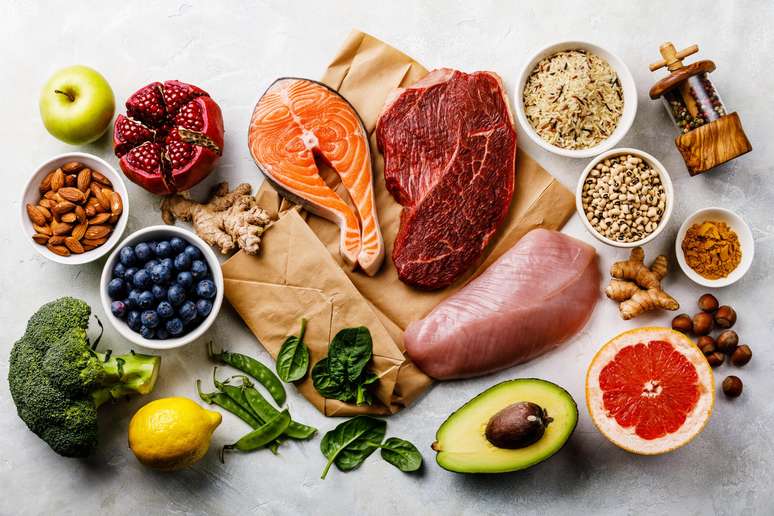Creatine and 3 other supplements help before and after training for muscle recovery
html[data-range=”xlarge”] figure image img.img-0eadceec98a243bf6ab95c854f13b5feqz5jbboh { width: 774px; height: 516px; }HTML[data-range=”large”] figure image img.img-0eadceec98a243bf6ab95c854f13b5feqz5jbboh { width: 548px; height: 365px; }HTML[data-range=”small”] image figure img.img-0eadceec98a243bf6ab95c854f13b5feqz5jbboh, html[data-range=”medium”] figure image img.img-0eadceec98a243bf6ab95c854f13b5feqz5jbboh { width: 564px; height: 376px; }
For those looking to gain muscle mass, planning your diet well is just as important as keeping your workouts up to date. And when just maintaining a balanced diet isn’t enough to get the desired results in physical activity, supplementation comes into play.
As nutritionist Cristina Menezes explains, supplements are effective before and after exercise. As a pre-workout, they help improve performance in activities. In the powder they contribute to muscle recovery.
“Furthermore, there is an acute and significant decrease in protein synthesis as well as increased rates of protein degradation that occur during and immediately after exercise. In this way, with an adequate recovery between training sessions, it becomes possible to avoid the catabolic effects and favor an increase in muscle mass”, underlines Cristina, specialist in Clinical and Sports Nutrition and Intestinal Modulation, speaking with Terra about the advantages of supplementation .
According to the nutritionist, the groups that require the most supplements are:
- young athletes, who are growing up
- people who impose food restrictions based on lifestyle or diet
- people with extremely high energy expenditure, caused by physical activity
“Regarding muscle power activities, there is good evidence that the common protein diet can limit muscle growth. Thus, the use of dietary supplements alone may promote hypertrophy.”
What are the benefits of creatine?
An organic compound also found in red meat and seafood, creatine improves performance during exercise. “Probably, the mechanism is related to a more accelerated regeneration of adenosine triphosphate, resulting from supplementation. This ergogenic effect may lead to a higher secondary development of training skills,” estimates the specialist.
Other functions of the compound are:
- increased power and performance in anaerobic burst activities;
- improvement of muscle fatigue and endurance, in the case of the elderly;
- increased strength;
- neuroprotective gain, also capable of alleviating conditions that promote depression in adults with depressive disorder.
But creatine is far from the only type of supplement. There are several other substances on the market, with different and/or complementary objectives. Meet some:
serum
Whey Protein, a supplement based on cow’s milk whey, is effective in increasing strength and physical performance, as well as promoting muscle recovery.
BCAAs
Acronym in English for branched-chain amino acids (valine, leucine and isoleucine), BCAAs improve disposition and, consequently, avoid the feeling of tiredness during activity.
Casein
Also extracted from cow’s milk, this protein helps increase muscle production and is best suited for long-lasting exercisers.
What to eat to gain muscle mass?
Nutritionists already heard from Earth they also tend to emphasize the importance of ingesting carbohydrates to aid training performance. Regarded as building foods, carbohydrates are one of the body’s main sources of energy.
But when choosing which product to eat, you need to consider at least two points:
- The glycemic index of the product
- The interval between the meal and physical activity
In the first case it must be taken into account whether the exercise will be done immediately after the meal or a few hours later. If the pre-workout is just before physical activity, the nutritionist Renata Brasil recommends the intake of low glycemic index carbohydrates. If the interval is longer, the preference is for medium or high glycemic index options.
Regarding the time between food and exercise, nutritionist Thaís Souza adds that meals eaten an hour or two before training should include a higher amount of protein.
Source: Terra
Ben Stock is a lifestyle journalist and author at Gossipify. He writes about topics such as health, wellness, travel, food and home decor. He provides practical advice and inspiration to improve well-being, keeps readers up to date with latest lifestyle news and trends, known for his engaging writing style, in-depth analysis and unique perspectives.








